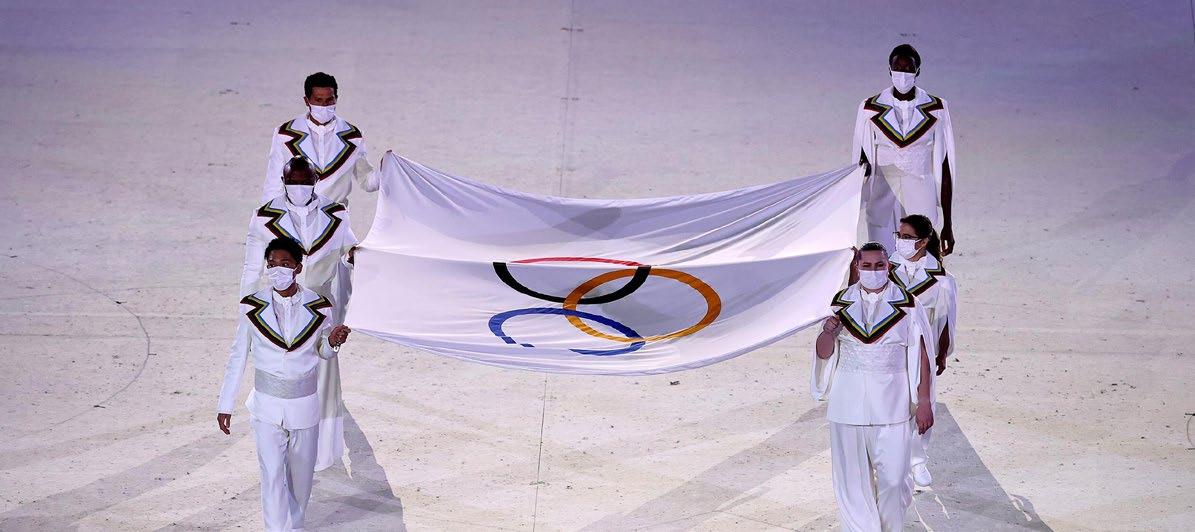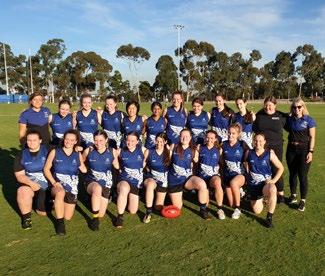
5 minute read
Clubs
from Annual Report 2021
by MUSport
The Softball Club were one of the many clubs that held pride rounds in 2021
Pitch Perfect: The Stalwart Behind Soccer Club
Harry Gill’s four decades with the Melbourne University Soccer Club (MUSC) has produced countless memories, friendships and triumphs seldom enjoyed outside the world of sport. As the Commerce and Law alum recorded his 700th game for the Club, he reflected on his remarkable feat and offered insights into what the culmination of 40 years’ participation had yielded.
When he joined the club as a firstyear student in 1978, MUSC was home to just one men’s team and was yet to introduce its women’s program. Now, with the club having grown to become the largest senior football club in Victoria, Harry remains an eminent figure among past and present players alike.
Ross Cameron, a teammate from 1986 to 2003, noted how upon joining MUSC he had been immediately impressed by Harry’s ability. And then, “as he aged, he had to play smarter, and the good sports people are able to do that. [On the field], he became much more of an architect.” It was this adroitness that allowed Harry to not only persist but to excel throughout his 700 games. From 2001, Harry served as both captain and assistant coach with the Uniblues, leading them to five consecutive grand finals and three championships. As a “big believer in pushing yourself to the highest level you can”, Harry shared that it was his early successes of which he is most proud of, a time when he competed at his highest ability. “It is still very frustrating not to be able to do things I could do well even in my forties,” he said. “I used to score a fair few headers because I had a very big leap; I probably miss the ability to jump the most.” While Harry is proudest of the first 329 games he played for the Club’s senior team, his contributions since 2007 have only entrenched his nonpareil status within MUSC. However, his nostalgia for his athletic prime might overshadow what many Club members would nominate as his most valuable contribution to MUSC. “One of the points that gets a lot of coverage when people from the Club catch up is just how much of a social livewire Harry has been,” explained Ross. Colloquially known as the ‘Harry Gill All-Stars Game’, the annual Uniblues’ Alumni match represents one of countless contributions Harry has made towards developing the fellowship of the Club. As a former teammate once put it, being “the glue that keeps us together” is arguably Harry’s greatest impact. The embodiment of these efforts was the after-game spread at Harry’s 700th match, put on by a wide array of Club members and former teammates, who shared memories of playing with Harry in the ’80s, ’90s and noughties and beyond. “[It] was sensational,” Harry said. “It was quite moving to see.”
Harry Gill (in blue) representing the Soccer Club in 1992

The Club came out to support Harry on his milestone game

Through his career, Harry has juggled the roles of club president and coach, while maintaining his status as a leading player. He attributes much of his longevity to constantly pushing his limits, though he conceded that as his career has progressed he has developed a new relationship with his body. “I learnt that one-dimensional fitness was no longer possible,” he said. “The passion is still there but, at 62, the body is prone to frustrate.” As he gradually replaces brute energy with diligent effort, Harry has come to relish new aspects of the game, including his mentoring of a new generation of players. “Something I have found very rewarding in the last 10 or 20 years is seeing younger players I have spoken to about their game coming through the ranks and improving, and sometimes coming back to me for further comments long after.” Over the same period, Harry has helped steer the Club through major change. The formation of the first women’s team in 1981 was a key development in the Club’s success. The women’s program has since expanded to six teams, serving as the largest women’s program in the state. The merging of the Uniblues and Rangers during the 2000s also stood out to Harry as a key development. Fierce rivals during the ’90s and early 2000s, the two teams competed to be the superior University team. While many saw him as being synonymous with the Uniblues, Harry openly advocated for merging the teams and encouraged his teammates to embrace the change. In hindsight, it was this pooling of talent that further underpinned the Club’s success, a trend Harry hopes to see continue. “The only thing I would like to see from the Club is for our senior teams to climb to a more competitive level … especially the men’s teams because I see that the women are already doing so.” Meanwhile, Harry’s professional accomplishments are a strong match for his athletic feats. A founding principle at Robinson Gill Lawyers, he focuses on personal injury and workers’ compensation. As Chair of the Law Institute of Victoria’s Workers’ Compensation Committee for nearly a decade, Harry has regularly consulted on, lobbied for and made submissions in regard to various pieces of legislation. WorkSafe Victoria went as far as to name an amendment to the WorkCover legislation the ‘Harry Gill amendment’. A life member of MUSC, Harry’s overall contribution is perhaps best encapsulated by the Harry Gill Medal, awarded to the Best Clubman each year. While he might have wished for the medal struck in his name to reward the Club’s best player, to do so would have understated his overall contribution to the club. Tony Clayworth, one of Harry’s earliest teammates and fellow life member, after whom the Clayworth Medal is named, recalled being a shy soccer fan from regional Victoria when he met Harry during their first year of College at the University in 1980; the first person who appeared to love the game as much as Tony. “And so begins a life-long friendship, with shared soccer experiences constantly nourishing us,” recalled Tony. “[It was further] cemented when the Melbourne University Soccer Club decided in 2016 to name club medals in our honour.” After four decades, 700 games (and counting) and an endless collection of memories and friendships, it is difficult to distill into a few words the motivation and desire Harry continues to carry with him into each new season. For Harry, it’s about “flowing football and the unbridled joy of being a part of something more. This magnificent Club.”










